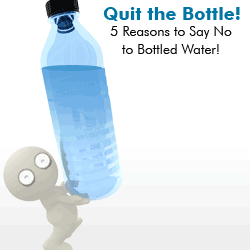Did you ever jab a friend with a pencil in grade school, and get reprimanded and told that it could cause lead poising? Well, so can water. Lead poising is nothing to joke about, and in fact, can cause many types of disorders, including difficulty sleeping. The sleeping disorder insomnia can be severe, as it can affect one's work and family life. There are many factors that can cause insomnia, but let's explore an environmental factor that can cause this disease, and also how water can treat it.

The statistic is alarming: about 30% of Americans are drinking water that contains lead levels in excess of the EPA maximum contaminant level. Lead, in larger quantities, is considered a metabolic poison and has caused people many untold ills such as damage to the kidneys and liver, nervous, reproductive, cardiovascular, immune and gastrointestinal systems.
In addition to insomnia, lead consumption in childhood can lead to a lower IQ and impairment in reading, writing, math, visual and motor skills, language, abstract thinking and concentration. Exposure to the toxic metal may contribute to crime and anti-social behavior in children.
Another element found in water that can cause insomnia is, MTBE is a chemical added to gasoline to reduce carbon monoxide emissions from automobiles. MTBE has, throughout the years, leaked into ground water. Reports of hundreds of people becoming ill have come to light and are connected to MTBE contamination in drinking water. Neurological symptoms aside from insomnia include headache, nausea, palpitations, anxiety, and some visual disturbances.
It is important to filter your water to prevent the side effects of these toxic metals, which include insomnia. If it is too late and the disorder has already invaded your life, you must treat it. To treat insomnia, it is best to get a consultation from a sleep doctor, usually a neurologist. They will determine if you need a sleep test to make the diagnosis. There are many medications used to fight this disease, as well as behavioral changes that can also be made.
Similar to alcohol and caffeine, which can influence body rhythms, so as sugar can do such, it is best to avoid those types of drinks. Some people think they can use alcohol to fall asleep, but it does not help. Also, caffeine and sugars act as a stimulant, so it should be obvious to avoid beverages with either or both to aid in falling asleep. Instead, drinking water- without lead of course- can help insomniacs sleep better.
Another reason insomniacs should drink plenty of water during the day is to stay hydrated. (But not 4 hours prior to bedtime, as the urge to urinate can wake them up during the night!) Water is our internal cooling and temperature balance system. Dehydration can lead to an increase of toxins in your bloodstream and can cause irritability in your physical levels of comfort and becomes more noticeable at night. Drinking water throughout the day can flush those toxins out of the body. That said, a healthy body is a more restful body!



